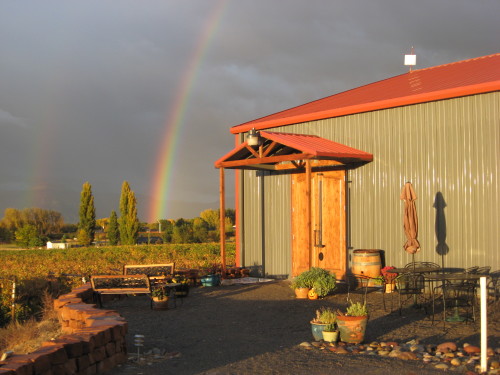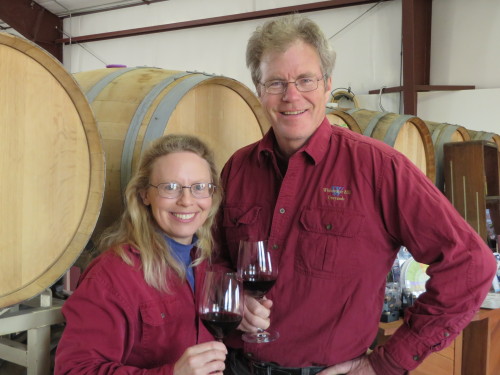
Gout de terroir.
Wine aficionados are familiar with this phrase, which refers to the “taste
of the soil” that gives great wines their characteristic flavor and aroma.
It’s not a word you hear much outside of the famous wine growing regions of
France, and perhaps California’s Napa Valley.
But since 2004 you’ll probably hear about gout de terroir in at least one other
place: the chilly, high-altitude vineyards of the prize-winning Whitewater Hill Winery–situated quite happily at
4600 feet in Grand Junction, Colorado.
It’s not a region where you’d expect to find a serious
oenological installation. But Nancy Janes and John
Behrs, the owner-operators of Whitewater, don’t see why that should stop
them from achieving their dream of making great, hand-crafted wines. In spite
of bone-chilling winters, and the occasional loss of 80 percent of their crop,
Janes and Behrs have made Whitewater into something of a tourist attraction as
well as a serious vineyard.
A Hobby That Got
Out of Control
Janes and Behrs (who are married) founded Whitewater as a
vineyard in 1998. They decided to become a winery as well in 2004—which means
they’re celebrating their tenth anniversary this year.
Like most small business people they wear many hats. Janes
is the winemaker and takes care of running the tasting room. She also manages
landscaping, driving, and sales. John is the vineyard manager and does all the
outdoor work, equipment repair, and tech support.

Tech support is the easiest part. Janes and Behrs were both
computer people before they reinvented themselves as vintners. John was an
electrical engineer; Nancy was a software engineer. And according to Janes,
winemaking was a hobby that got out of control.
“We were home winemakers before we ‘went
commercial’”, she explains. “We were fascinated by the fact that you
could grow classic European varietals in an ‘interesting’ climate like
Colorado. It’s a unique microclimate here in our valley. When we can get the
grapes through the winter the quality is incredible, and it allows us to make
some world-class wines.”
Isn’t it quite a change from the world of high-tech?
Actually, she says, being engineers ties in quite nicely
with winemaking, which requires a lot of attention to detail. “We take a
lot of classes, and we build a lot of spreadsheets. Spreadsheets are our bread
and butter.”
Fruit Basket
What in the world led Janes and Behrs to start a vineyard in
an inhospitable locale like high-country Colorado?
“Colorado turns out to be a great place for growing
grapes,” says Janes. “We have a unique microclimate right along the
Colorado River almost to the Utah border. This protected valley is a
traditional fruit basket for the region. There’s lots of sweet cherries,
peaches, and apples grown here. The valley is mild enough during the winter,
and stable enough in temperature to allow us to grow excellent commercial fruit
crops.”
“We’ve had some difficult years,” Janes admits.
“Normally the valley doesn’t get below zero, but we’ve seen some tough
winters, and only time will tell how many more of those we’re going to see. We
had a very challenging winter last year; we only got 20 percent of our usual
crop.”
But once Janes and Behrs get the grapes through the winter
there’s enough heat, and a long enough growing season to make lovely
wines—wines that have done extremely well in international competitions.
Varietals Are
the Spice of Lif
“We’ve been growing the classic vinifera wine
grapes,” Janes continues, “but they’re a little less cold-hardy so
we’re starting to grow some hybrid grapes like Chambourcin and St. Vincent that
give us more crop during colder winters. We grow Cabernet Franc, Cabernet
Sauvignon, Merlot, Syrah, Chardonnay, and Muscat. Riesling does very well for
us here in the valley too.”
Janes and Behrs started their website in 2004—but it’s still
less sales-oriented than they’d like.
“We ship wines to the few states we can,” Janes
explains. “But the regulations on shipping alcohol are an interesting
challenge. You have to have a separate permit for every state, hold a bond, pay
taxes in that state, and the paperwork is horrible. Some states won’t let you
ship at all.”
On the Road
In addition, Janes sells the wine wholesale where she can,
driving between Grand Junction, Denver, Fort Collins, and Colorado Springs with
a car full of wine bottles. She gets an appointment to visit a shop, lets them
taste the wines, and hopes they might be interested in carrying them.
Even so, about 70 percent of Whitewater’s sales are tasting
room sales.
“We get mostly an entry-level crowd,” says Janes.
“I make a Sangria-like red called Sweetheart Red that’s extremely popular.
For customers who are more experienced my Cabernet Franc has been a huge
seller. It’s a full-bodied red with a bit of earthiness to it, and it won Best
of Show in our Colorado Mountain Wine Festival this year. Great fun.”
Whitewater’s competition record really is quite impressive.
Janes won a double gold medal for her dessert wine at the Finger Lakes Wine
Competition—a serious, international contest. Last year she took home the
Commissioner’s Cup for Best Wine in the Valley for her Reserve Red Blend. And
her 2012 Ethereal has recently gone Gold at both the Indy International Wine
Competition and The Jefferson Cup.
Janes also makes a prize-winning ice wine. “The grapes
have to be left on the vine until Mother Nature freezes them,” she
explains. “Then you pick them and press them and make wine out of them.
It’s risky, but it makes an amazing dessert wine. Between our high elevation
and the terroir, the wines are
intensely fruity and floral.”
Going the Other
Direction
Janes’ and Behrs’ high-end spreadsheets helped get
Whitewater past many of the usual start-up challenges. “You want to spend
your time with your customers,” she laughs, “and making your wine,
and you don’t anticipate how much paperwork is involved. Taxes and forms and
licenses and all that stuff. Being software folks, we set up some reports
coming out of the computer database that helped us a lot.
Whitewater’s biggest challenge today is the one no one can
do anything about: the weather. "We don’t have much control over
that,” says Janes. “We’ve tried to address this by planting those
hybrids. And we have wind machines at two of our locations. But sometimes it’s
just too cold for that to help.”
For the immediate future, the key challenge Janes and Behr’s
can control, is getting wider
wholesale distribution. “There’s a limit to the number of folks who can
physically get to where we are,” says Janes, “so to get our wines in
front of more folks we have to go the other direction.”





